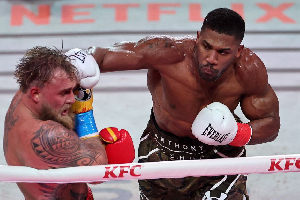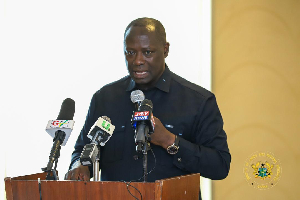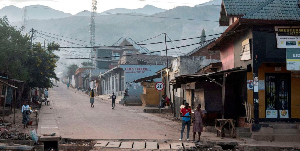As labels go, I guess writing this article puts me squarely in the ‘anti-chieftaincy camp.’ For years I have been content to stay on the sidelines and watch the chieftaincy debate rage on. I have enjoyed the intellectual arguments on both sides of the issue. I have also been disappointed in the pandering and hypocrisy on the subject especially on the part of politicians and elected officials – which climaxed at the pomp and pageantry of the Ghana @ 50 celebrations where topics like the “duality of governance” ruled supreme. None of the politicians who laud the goodness of chieftaincy in Ghana submit themselves or their close associates to the mercy of the institution. Their squabbles are litigated in the courts and not before chiefs. I have also been dismayed by the diatribes (insults) that abound in chieftaincy articles and comments on Ghanaweb. Some of our good Ghanaians are over-expressing our newly acquired freedom of speech on the free media.
Why now? Why do I leave my comfort zone to write this piece? I have been yanked off the fence to debunk assertions laid out in three recent pro-chieftaincy articles on GhanaWeb. The articles ‘Chieftaincy and Democracy,’ and ‘Ghana's Chieftaincy Debate’ (I & II) either make blatant false claims e.g. ‘God established chieftaincy’ or use spin to build houses of cards and present them as if they are edifices of brick, mortar and steel. Examples of the later include claims like the Akan system of selecting a chief is democratic or chieftaincy is a dynamic and progressive institution. The author of ‘Ghana's Chieftaincy Debate’ (I & II) actually uses his articles to spew ethnocentric bias, writing among other things that Akan feudal monarchy type of chieftaincy is responsible for corrupting the Ewe chieftaincy system; under “Akan monarchical model of chieftaincy,... chiefs at one point became cocoa barons who profited on the backs of their people ... determined what was produced during the cocoa boom periods of the past,” started land mismanagement which ultimately spread to Ewe areas. Although this article examines and exposes those false claims as well as the cheep ethnocentric propaganda, it does not in anyway advocate for the continuation of Chieftaincy in Ghana. The institution has lived past its usefulness and articles like the Chieftaincy debate I and II are “much ado about nothing.”
Claim - “Chieftaincy is an institution established by God ... (please refer to 1 Samuel 10:1).” As I read this falsehood, lines from Shakespeare’s Merchant of Venice coursed through my brain. “The devil can cite scripture for his purpose...... Oh! What a goodly outside, falsehood hath.” I am not asserting that the author of the article is the devil. The author however, used scripture wrongly to support a false claim. The story of Kingship in Israel begins in 1st Samuel chapter 8 verse 4. That chapter tells us the four truths listed below.
1. Kingship existed among Israel’s neighbors. God did not institute it for them. The people of Israel asked God for a king so they could be like their neighbors - the Ammonites, Philistines etc.
2. Israel’s request for a king meant a rejection of God’s direct rule (theocracy) presented through his prophet Samuel.
3. Samuel took this rejection personal and God had to assure him that the people were rejecting God and not Samuel.
4. Samuel enumerated the inherent problems of kingship to Israel and in time all his misgivings became manifest.
The anointing and coronation of Saul in chapter 10 therefore show God consenting to Israel’s request. Asking why God consented to Israel leads to the broader question of why God allowed sin to enter the World in the first place. Kingship in Israel existed for only a brief period of their history and is covered in just six (6) of the Bible’s sixty-six (66) books.
Claim - Akan System of selecting a chief is democratic. Whew!!! Webster’s online dictionary defines democracy as “a government in which the supreme power is vested in the people and exercised by them directly or indirectly through a system of representation usually involving periodically held free elections.” This does not describe any Ghanaian chieftaincy institution or its selection process. The biggest problem with the chieftaincy institution is the hereditary nature of succession. Succession clashes over Akan stools do not occur because Aduana clan members try to ascend Oyoko stools. Ewes do not clash because outsiders try to ascend to the Asogli or Anlo stool. Ninety percent of the time, succession clashes occur because members of the extended family to whom a stool belongs become too numerous and begin to fight among themselves when the stool becomes vacant. In Ghana’s endemic extended family system, generations of child birth can quickly balloon a family nucleus from two, four or ten people to a large group of about a thousand. Usually the group becomes unwieldy with growth and breaks into fashions with each fashion staking a claim to the stool. There are cases where an extended family fashion may opt not to seek the stool for years or may get skipped over for a variety of reasons. When future generations of that fashion come around to ask for the stool, cannons roar and very bitter fights ensue.
There are also situations where two or three groups with no single dominant leader settle in a village at the same time. Often this type of settlement adapts rotational succession where the stool is passed from group to group. In this scenario, the exponential number of claimants to the stool can be very remarkable down the generations as the population of each individual group swells up. Inter marriages and cross marriages further blur or blend the lines between progenies so much so that six or eight generations down the line, it becomes difficult to determine who belongs to what group. Just as in the single family nucleus scenario, a group can get skipped in succession or may choose not to ascend the stool when their turn comes. All hell breaks loose when this skipped group comes back generations down the line to ask for the stool.
There are few situations where extraneous circumstances like prolonged wars, infertility, sickness or plague deprive a group of bonafide male progenies to their stool. The group sometimes elects to give the stool to an outsider (e.g. former slave or prisoner of war) they have adapted into their mist. Depending on the circumstances, the stool linage can be corrected quickly after a single episode or may linger on into multiple successions. In either case this deviation although initially voluntary can become a bone of contention and litigation as future generations use it to justify their claim to the stool.
Claim - Chieftaincy is being modernized as evidenced by the installations of highly educated chiefs. This is pure spin. Although it is very true that communities across the country are installing chiefs with years of formal education, the institution is not being modernized. The reverse is actually occurring. Chieftaincy is thrusting highly successful and educated professionals into the Stone Age making them unreasonable to deal with. More than three quarters of all ongoing chieftaincy succession disputes in Ghana involves educated or successful businessmen. From the pedestal of traditional authority, educated chiefs often make pronouncements that defy all reason, case in point, the recent call on the Nation to make a chief the speaker of parliament. This call was made by a chief who has the title Doctor (unspecified whether a medical doctor or PHD holder). One wonders if Nana, the Doctor, put some thinking in this thought. Four or five king makers in some obscure corner of the country give their community’s stool to a person for whatever reason and we as a nation should take heed of this and give him power over all our elected legislative officials by making him speaker of parliament, second in line to succeed the president of Ghana in an emergency. Mmmmm!!! This is modernization par excellence! Of late we are seeing chiefs who live and work miles away from their people. For goodness sake a chief is supposed to be a local leader. How can the local leader of a Brong town live and work in Accra or worse in USA or Canada? Who can local folks seek to redress wrongs or ask for resolution of their everyday problems? Who is supposed to lead community mobilization - a hapless surrogate? Who then needs a chief?
False Claims - Ewes originally had priestly tradition of chieftaincy but were pressured to adapt Akan type monarchical chieftaincy through amalgamation which ultimately corrupted their system and may have even led to such greedy practices like the trokosi. Wow!!!! These half truths woven together with lies to promote ethnocentricity remind me of the propaganda of the pigs in George Orwell’s Animal Farm; “four legs good, two legs bad: Ewe ways good, Akan ways bad. Interestingly, the author begins his main discussion with “to every utterance there is a motive,” how very clairvoyant. Were Ewes pressured to give up their priestly chieftaincy tradition to adapt the corrupt Akan version? I am no expect of Ewe history being Brong born so I defer to the writings of experts like Prof. D. E. K. Amenumey of the Department of History - University of Cape Coast whose work on Ewe History is published on Ceanaonline.org and that of Carly Ahiable, author of “My African Village” published by Africa Media Service.
Truths - Ewes trace their origin to Ketu, sometimes referred to as “AMEDZOFE or MAWUFE,” an Oyo town in modern Benin where they lived under strong monarchical kings whose progeny today boast of a thousand year rule. For no known reason they migrated westward and settled at Notsie, again under monarchical rulers. They stayed until a tyrant ascended the Notsie throne then fled. They fled in groups to settle in present day Benin, Togo and Ghana. Some of the groups like the Anlos or the people of Kpando had togbes or chiefs leading them all the way. They settled in Ghana with a monarchical form of chieftaincy already in place, no thanks to Akans. Some of the groups were too few in numbers, others had too many leaders, yet others settled in areas that were already populated by other ethnic groups like the Guan and could not form a monarch like chieftaincy to hold sway over land that technically belonged to others. Whenever possible however, Ewes, like the other tribal groups that migrated from Ketu (Fons of Dahomey, the Ga Adangwes and the Gbes of Ghana) tried to form a monarchical type chieftaincy. The 1956 plebiscite gave the unsuccessful ones sway over other indigenous people in Ewe populated areas.
Trokosi, the practice of making young innocent girls slaves of the gods (pawns of unscrupulous fetish priests) is not and cannot be a product of an Akan like chieftaincy practice. Under Akan chieftaincy, as with all monarchical systems of the world, priests serve at the pressure the chiefs (monarchs) and although some can be greedy they are never power houses strong enough to promulgate a system of slavery. At any rate if the author’s conjecture was true then Trokosi, fiashidi would be limited to the Ewes of Ghana. Unfortunately, the practice is found in Togo and Benin as voodoosi. It is a product of Ewe fear. How else does one explain a system that asks families to send five or six generations of their innocent daughters to shrines to atone for microscopic wrongs in attempt to void off imagined future calamities? An article on the Web “Eweland Culture,” woefully attempts to justify this practice using the Biblical stories of Samuel and Jephthah’s daughter. Samuel’s story has parallels worldwide. From ancient Egyptian priests to Tibetan monks, kids dedicated to deities grow up to become priests of those deities as happened with Samuel. None of the Ewe trokosi’s ever become a priestess of the deity. In the case of Jephthah’s daughter she was sent away for two months then returned to live a life a spinster in her father’s house. Only one person was affected, just her. Trokosi on the other hand does not just affect one life, it is multi generational.
False Claims - Land litigation which casts negative light on the chieftaincy system is attributable to Akan feudal chiefs who at one point were cocoa Barons and determined what was grown. Akan chieftaincy has a caste system even if it is not spoken of, while the Ewe system does not “commodify” land. Truth - Land litigation in Ghana is not a relic of a distant Akan cocoa boom era. It is ongoing from the fringes of the Keta Lagoon in the South to the Ghana Bukina Faso boarder in the north, over lands that have never seen a cocoa seed or an Akan chief. In most areas of Ghana, land can be leased and not sold outright. A lessee can claim ownership as long as there is evidence of ongoing utilization of the land. Farmlands can lie farrow for years after the initial cultivation due to land and crop rotation. Often farmland ligations are about boundaries as huge trees and plantation crops that once served as demarcation between properties get eradicated by bush fires or the passage time. Other ligations arise when an elder dies and extended family members fight (usually about size apportionment) over family lands. In villages, towns and cities, litigation is over plots for home building. As growth and sprawl make once farmlands prime town and city plots, chiefs and some local people suddenly find themselves sitting on pots of gold. The lack of documentation or maps make these lands a constant source of problem as communities attempt to parcel out them out as home plots instead of farm lands.
There is no record of Akan chiefs levying cocoa farmers. What existed was a system of share cropping where those who could not afford to lease lands were allowed to cultivate and farm for a fraction of the yield usually a third. In time this allowed most of the share croppers to acquire enough capital to afford their own lease. Was this practice a caste system? No - it allowed upward mobility. On the contrary areas that allowed no land “comodification” condemn late arrivals and outsiders to perpetual low class citizenship since they can never own their own land. Is Akan chieftaincy a caste system? Yes, all chieftaincy in Ghana is a caste system. Webster’s Online Dictionary defines caste as “a system of rigid social stratification characterized by hereditary status, endogamy, and social barriers sanctioned by custom, law, or religion.” All chieftaincy including the priestly type is a hereditary or customary caste system. Trokosi is both a customary and religious caste system.
The system of replacing virgin tropical rain forest with tree crops instead of casava or corn plants is one of the best practices of Ghanaian farmers. Scientific evidence fully supports this. Soils of sub-Sahara Africa are very poor. Only a thin nutrient rich top layer supports the lush trees. Once the trees are removed through slash and burn farming practices, the soil looses most of its nutrients and quickly became scrub and grassland. Akan farmers allocated virgin lands to tree crops like cocoa and inter-planted them with plantain crops. By so doing our formally uneducated forebears were not only helping to preserve the nutrients in the soils, they were helping save the planet from Global warming. Yams, cassava, corn and other staple food crops were cultivated on land that were not so rich and has been left to lay farrow for years under the land and crop rotation system.
Although the ongoing chieftaincy debate in Ghana is very appropriate and can sometimes be very educational, some authors are clearly using the forum as a vehicle to promulgate ethnocentricity, bigotry and tribal hatred. Others use falsehood to justify the unjustifiable or defend the indefensible. This article has sought to separate the chaff from the seed and show that most Pro chieftaincy arguments are “Much Ado about nothing.” Chieftaincy in Ghana is a cultural relic to be preserved in museums.















